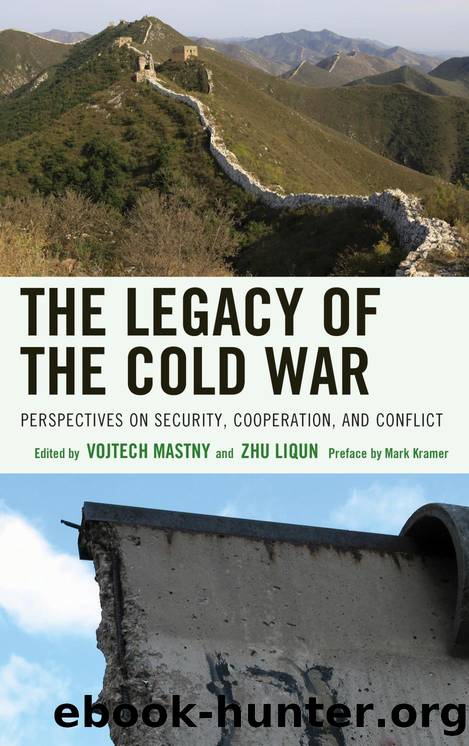The Legacy of the Cold War by Mastny Vojtech; Liqun Zhu; Kramer Mark

Author:Mastny, Vojtech; Liqun, Zhu; Kramer, Mark
Language: eng
Format: epub
Tags: undefined
Publisher: Lexington Books
Published: 2012-07-15T00:00:00+00:00
Europe’s Place in the World
Of all international organizations, the European Union takes the pride of place in its rules-based system with a common political vision and clear commitment to its implementation.[28] On other continents, regional organizations resemble diplomatic conferences based on a consensus. Southeast Asia’s Association of Southeast Asian Nations (ASEAN) plays a useful role, particularly in the economic field, but its political activities are limited by its practice of leaving sensitive issues aside. The African Union is doing better than its predecessor, the Organization of African Unity, particularly in having organized several peace support missions on its continent, but still shows little coherence in dealing with failed states and undemocratic regimes. The Russian-led Commonwealth of Independent States and its Collective Security Treaty Organization have had little to show, as had the Shanghai Cooperation Organization, designed primarily to deal with terrorist threats.
The development of the EU has been uneven, and the original drive and enthusiasm have weakened, to the extent that the Treaty of Lisbon, which entered into force as recently as December 1, 2009, is likely to be the last comprehensive attempt at enhancing the community’s coherence for a long time to come. Neither governments nor their peoples have shown much appetite for another lengthy convention or intergovernmental conference, followed by inevitable referenda. Future constitutional improvements are likely to be inserted in new accession treaties while the hybrid nature of the EU will continue, with a “communitarian” system for the internal market and trade policies and a more classic intergovernmental approach for foreign, security, and defense policies, decided by consensus. In the United Kingdom, Prime Minister David Cameron has expressed the desire to return some competences from Brussels to national governments, but did not spell them out in detail. His announcement of a referendum in 2017 was not welcome to the other members and threatened to push the United Kingdom to the sidelines for years to come. Even the United States made it clear that the United Kingdom should remain in the EU if it wanted to keep a special relationship between the two countries.
The recent global financial crisis, while consuming much of the energy of the EU’s member countries, has been conducive to ultimately leading to more integration of economic and budgetary policies and oversight of the financial sector, at least within the euro zone. The European Council of December 8–9, 2011, ended with a disagreement with an increasingly isolated United Kingdom and the prospect of new binding commitments for budgetary discipline among the other members. After the Cyprus crisis, the EU’s “Banking Union” (a vague word for a fairly clear concept) would have to be rapidly established. In theory, this would not necessarily have an impact on intergovernmental policies like foreign affairs and security, where the Lisbon Treaty changed little and decisionmaking remained by consensus. Similarly, the rejection of the European Constitution, the predecessor of the Lisbon Treaty, by referenda in France and the Netherlands did not have much of an impact on these policies. Conversely, the
Download
This site does not store any files on its server. We only index and link to content provided by other sites. Please contact the content providers to delete copyright contents if any and email us, we'll remove relevant links or contents immediately.
| Automotive | Engineering |
| Transportation |
Whiskies Galore by Ian Buxton(41533)
Introduction to Aircraft Design (Cambridge Aerospace Series) by John P. Fielding(32890)
Small Unmanned Fixed-wing Aircraft Design by Andrew J. Keane Andras Sobester James P. Scanlan & András Sóbester & James P. Scanlan(32574)
Craft Beer for the Homebrewer by Michael Agnew(17935)
Turbulence by E. J. Noyes(7702)
The Complete Stick Figure Physics Tutorials by Allen Sarah(7143)
Kaplan MCAT General Chemistry Review by Kaplan(6597)
The Thirst by Nesbo Jo(6439)
Bad Blood by John Carreyrou(6278)
Modelling of Convective Heat and Mass Transfer in Rotating Flows by Igor V. Shevchuk(6225)
Learning SQL by Alan Beaulieu(6037)
Weapons of Math Destruction by Cathy O'Neil(5832)
Man-made Catastrophes and Risk Information Concealment by Dmitry Chernov & Didier Sornette(5650)
Digital Minimalism by Cal Newport;(5392)
Life 3.0: Being Human in the Age of Artificial Intelligence by Tegmark Max(5189)
iGen by Jean M. Twenge(5163)
Secrets of Antigravity Propulsion: Tesla, UFOs, and Classified Aerospace Technology by Ph.D. Paul A. Laviolette(4995)
Design of Trajectory Optimization Approach for Space Maneuver Vehicle Skip Entry Problems by Runqi Chai & Al Savvaris & Antonios Tsourdos & Senchun Chai(4843)
Electronic Devices & Circuits by Jacob Millman & Christos C. Halkias(4749)
